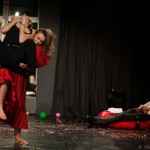Let’s go.
We can’t.
Why not?
We’re waiting.
Samuel Beckett, Waiting for Godot.
There are many words for a recess in the English language. Recess. Interval. Break. This last one is the one that Tom Holter and Mark Terkessidis remark on in their book „Fliehkraft“. For them, the break is „a forced recess that ruptures one’s own time … until one is broken because of the loss of one’s time.“
In his drama „Waiting for Godot“, Beckett creates an absurd waiting situation, a world where movement has almost ceased. A world where a gruelling perpetuity comes into being.
In a world where freedom, acceleration and immediate satisfactions of one’s needs are normal, waiting is a sign for inertia and disinterest. And yet, we cannot elude it. Waiting dictates our professional lives, our recreational activities. We wait.
What are we waiting for? What is each one waiting for? Where does the self-caused stagnation start and where is fate lost in political powerlessness, social ignorance or conscious resignation? When does the stagnation caused by waiting start to hurt? Where is the moment of catharsis that comes out of the moment of lethargy?
We wait. Well, actually: I wait. You wait. He waits. She waits. For in the act of waiting, we are alone. We are forced to deal with the self. At best, the other serves some kind of distraction. At worst, he or she becomes a blank screen on which I project my fantasies, provoked by the idle, waiting mind. The search for meaning in the other.
In this moment of lethargy, boredom, impatience and nervousness, is there room for levity, humour, touch and joy?
The actors immerse in a state of motionlessness. They are lost between waiting and expecting and the audience is right there with them – not knowing whether they are waiting for something, expecting it, or have already lost the train of thought.
concept and scenario: Linda Sollacher, Assunta Steiner
music: Juan Klaus Obermayer
scenography, costume design: Linda Sollacher
cast: Aneta Orlik, Kim Bormann, Katarzyna Gocał, Karol Pruciak, Piotr Mateusz Wach









